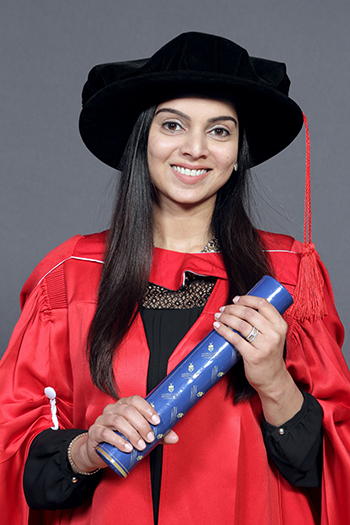

Dr Safia Mahomed
Biobanks contain human tissue and other biological material and can be an invaluable resource for medical research, but it must be properly regulated to ensure ethical use. Dr Safia Mahomed, a senior lecturer in the Department of Jurisprudence in Unisa’s College of Law, is helping to ensure that biobanking in South Africa is approached in a way that respects and protects the rights of research participants whose samples are stored for health research purposes.
Mahomed’s research on the ethico-legal regulation of biobanks in South Africa has been translated into national policy. Her work forms the backbone of the Material Transfer Agreement (MTA) of Human Biological Materials that the national Department of Health published in Government Gazette 41781 in July 2018.
The MTA includes ethical and legal principles, and sets out a template for cross-border transfers of human materials. "Even though biobank research is already incorporated (to a limited extent) into national ethical guidelines, its complexities call for the establishment of firm principles," says Mahomed. This is especially necessary with regard to informed consent and secondary uses, ownership of materials, privacy and confidentiality, benefit sharing and cross-border transfer requirements.
In her PhD (which Mahomed received from the University of the Witwatersrand in July 2018), she sought to critically examine ethical and legal requirements for biobank research in South Africa, with the objective of identifying gaps and areas of improvement towards creating a framework that responds to and promotes South Africa’s needs. These needs include protecting populations, communities and individuals involved in biobank research while, at the same time, facilitating improvements to promote research that advances scientific progress.
The MTA includes ethico-legal principles, incorporates broad consent, benefit sharing and contains provisions on termination of the research project, dispute resolution and publication rights for local researchers.
As the first document of its kind in South Africa, the MTA balances law and ethics with science, adding value to the social and human sciences. It seeks to foster progress while establishing a trust relationship between a participant and researcher, and protects South African research participants and researchers from exploitation.
"Complexities associated with biobank research are far-reaching and range from social and ethical to legal issues," says Mahomed, who is deeply committed to protecting the rights of the people and communities involved in biobank research.
In promoting the fundamental right of human dignity, which is closely linked to human health research, Mahomed hopes that her research will provide protection to the most vulnerable populations in society. Mahomed chairs the Biotechnology and Medical Law Flagship within the College of Law. Together with her team, she hosts community engagement projects that are relevant, topical and respond to current health-related issues in the country.
Mahomed will continue to generate ethical and legal safeguards when new science is developed, with the intention of benefiting human wellbeing and health, through funding from Unisa’s Vision Keepers Scholarship Programme, which she was awarded in 2018. This research scholarship includes her working on a collaborative project with Prof Bartha Maria Knoppers, Director of the Centre of Genomics and Policy, Faculty of Medicine, Human Genetics, McGill University, Canada. The project will entail comparative research on the ethical and legal aspects related to the biobanking of human material in Canada and South Africa.
In her area of speciality Mahomed publishes widely, in both local and international journals. She is also an active member of institutional and national committees, including the UNESCO Social and Human Sciences Sector National Bioethics Committee. In 2018, Mahomed was nominated for the Principal’s Prize for Excellence in Research.
* By Mpho Moloele
Publish date: 2019-01-25 00:00:00.0